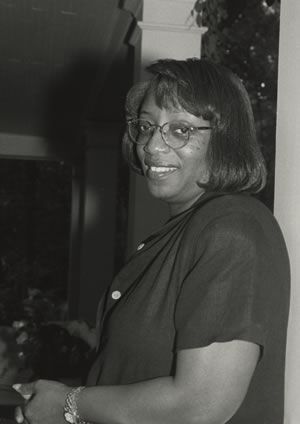Sandra Campbell-Jackson
Over 4.3 million children in the United States grow up in kinship care families, homes of people other than their biological parents—grandparents, aunts and uncles, older siblings, or friends who have taken on the role of parents in shattered or troubled families. Supporting a dependent child can be a complicated new responsibility for people coping with needs and problems of their own. Sandra Campbell-Jackson has made it her life’s work to respond to the needs of these alternative caregivers and of the children in their care. She has brought to life to a community of kinship families in Philadelphia and created a model for other communities.
Sandra’s own experience growing up in an alternative family played a major role in shaping her life’s work. When she was 18 months old, she and her sister were sent to live with her maternal grandmother and a cousin, respectively. “When you are a child that’s raised by other people, there’s always that kind of lonely abandoned feeling. Your heart or head doesn’t always accept the people who are caring for you. . .Sometimes I felt foreign to my grandparents,” she says. Sandra joined the armed services and was trained in heavy artillery repair. Soon she became involved in crisis support for military families and spent the next fifteen years traveling with her daughter to different military postings, both in the U.S. and in Europe.
In 1989, the family took up permanent residence in Philadelphia. Sandra worked as an employment counselor for the 18th Street Development Corporation in South Philadelphia and identified the need for special services to provide support for kinship families. She founded an informal peer support group called R.O.C. (Raising Others’ Children). R.O.C grew to encompass a variety of services—peer assistance, crisis management training, and annual summer camps designed to address the host of issues faced by abused and abandoned children. “Families need to have serious links to resources—basic help on how to keep their electricity on, how to pay for the heat, how to budget,” she says.
Sandra looks at both ends of the kinship care equation—elders and youths. For the last six summers, she has run a camp for children in kinship care, each year with a different theme. She raises cultural awareness and provides respect through her work—integrating bits of history into daily activities, arranging visits to important historical sites, and encouraging reading, song, dance, and creative arts that draw on African-American traditions. Sandra’s childhood daytime caregiver taught her that her heritage and a sense of history could bring strength, greater self-awareness and pride. “[She] was a story teller,” Sandra says, “and she passed that on to me. . .she took me back to slavery. . .when the other children were running around picking blackberries I’d walk along the railroad track with her, hanging on to every word she said.”
Four summers ago, Sandra organized a retrospective voyage, which she called “A Tale Twice Told,” that enabled her to bring this historical awareness to 81 Philadelphia and Detroit caregivers and their children. Starting in Canada at Uncle Tom’s Cabin and traveling south to the Sea Islands of Georgia, the group’s two buses reversed the route of the Underground Railroad. “I wanted to show families that if they had survived slavery, they could survive the scourge of drugs in their communities,” she says. When they arrived at the sea coast islands of Georgia ten days later, Sandra was awestruck by the sight of “children wading in the same waters that before them slaves had walked out into to drown themselves rather than be held in slavery.” Much of the funding for the trip came from bake sales and chicken dinner sales that she and the families organized.
In the beginning of 1998, Sandra left R.O.C. to begin work on Philadelphia’s Grand Central project, which intends to build on the work of the city’s task force on Kinship Care. Sandra dreams of starting a nursery and care-giving project for babies abandoned in hospitals by drug addicted mothers and is looking for funding to start the project.
Sandra Campbell-Jackson’s greatest challenge is balancing the needs of her immediate family and those of the vast extended family of kinship caregivers that relies on her for support, leadership, and motivation. But even in the most difficult times, Sandra says she feels supported by her grandmother’s love and by the sense that she is doing what she is meant to do. In her work on kinship care, she has mothered not only many individuals, but also a new, more forgiving, and more supportive model for alternative care-giving communities.
 Photo by Dorothea von Haeften
Photo by Dorothea von Haeften